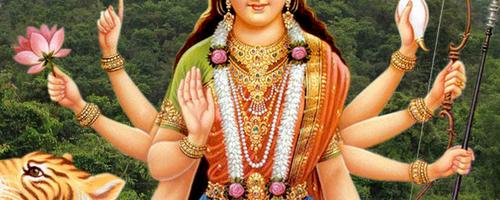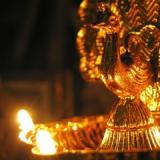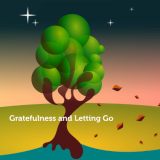
After my write-up on the philosophy of Hinduism, I got a fair bit of interest from people wanting to know more on the issue. Wendi was preparing to do an ethics presentation on Hinduism and stumbled across my article during her research. She sent me a few questions she had on Hindu beliefs, one of which was about the Hindu take on spiritualism and the afterlife.
More recently, I was chatting with a friend in Mexico who had a similar query. The amount of Spanish literature about India seems to on the rise in recent years, so a curiosity about the culture is a natural side-effect. She wanted to know about the Indian belief in past lives, and my take on it. My replies to both these questions, one academic and one more personal, was broad enough to be of general interest, so I thought I’d share my thoughts here.
The Hindu view on the afterlife is that the essence of life is immortal and cannot be destroyed. As with all things in the Indian belief system, this basic idea can be interpreted and understood on many levels. The very religious view is that the individual soul survives intact and is reborn in another form. The more philosophical interpretation could be that that life energy can neither be created nor destroyed, but can only be converted from one form to another. How much of each of those opposing ingredients you wish to put into your own personal afterlife sauce, is entirely up to you.
Rebirth is said to be based on the concept of Karma — a distillation of past actions, behaviour and thought. In the most simplistic way, you could think that your next birth depends on whether you’ve been bad or good. That’s how many understand it, but the philosophical thought is more complex. It considers all of physical life to be a sort of audio-visual-experiential tempering ground for the soul. The soul is born and reborn in various forms and as various things, so as to gain all the experiences it needs to come to a true realisation of the nature of existence, i.e. enlightenment. This is also thought to be based on Karma, but here the process is not considered as one of punishment, but rather of evaluation. The soul decides what experience it requires as a next step in its progress towards enlightenment, and then takes that step.
All generally agree that once enlightenment is reached, the soul is freed from the imperative to be reborn and take physical form. It is then finally one with the ultimate soul/God/the universe/or whatever you want to call it. That’s where the Buddhist concept of Moksha come from. Liberation.
When chatting with my Mexican friend, her questions about what I was describing brought up some interesting contrasts that don’t come up in detached philosophical musings like the one above. I was telling her about the Hindu belief that people, animals, and all life is born and reborn, depending on your thinking and behaviour in your current life. For example, predominantly greedy and inhuman thoughts might lead to a birth as an animal, a creature of instinct. But, nothing is permanent, with each life you learn, hopefully improve, and are born in higher and higher forms until you achieve nirvana &mdash the same enlightenment I described before &mdash you understand how it all works, and you are freed from the cycle.
This was a more ground-level description of what regular people believe, free of philosophical detachment. Her counter-question was interesting. She said that if you´re reborn as an animal, for the animal´s life you would not be aware, as animals don´t think. So how could you behave well to be reborn in human form? Or are you just a human in an animal´s body? That’s a question that would have never occurred to me, but it is a very valid one if you believe that the human soul is unique, which is the basis of all the Abrahamic religions (Catholicism, Judaism, Islam). By contrast, most Eastern religions generally believe in the soul being common and equal across all life. Human beings might largely be more developed souls, but other life has a soul too. This fundamental difference in thinking is part of why there are so many vegetarians in India. It comes from that belief that ending any life too early, and especially an animal one that is closer to the human level of consciousness, is to stop its development prematurely and prolong its time in the cycle.
Of course, there is much commonality in the thinking about the afterlife across all religious thought, even if the details vary. It all comes down to your behaviour in life, with the afterlife serving as reward or punishment. My friend had the same thought about her beliefs and the concepts of heaven and hell. She did, however, detect the abstractness of what I was saying in comparison, so she wondered whether I thought I would be reunited in any way with my loved ones when I died. Now, this is one of those points where what we believe depends on how comfortable we are with the dissolution of ourselves in the larger scheme of things. It’s safe to say the the philosophical stream of Hindu thought thinks of reuniting of souls after death in a more abstract way. That is to say, the specific personalities we take on in life may not survive the transition, but souls that have been close in their lives will recognize each other. Maybe not always thinking of each other as mothers and fathers and sons and daughters, but just as kindred spirits. It comes from believing that the soul or spirit is the real thing, and the person is merely a temporary costume.
I myself am not completely sure of what I believe, because I like to think beyond blind belief. Either way, I look at all the different ways of seeing and interpreting this existence of ours, and I find it all very fascinating. While being part of Life, what life is remains one of the greatest mysteries, not just to the philosopher but even to the most rigorous scientific minds. So it comes as no surprise that the end of life garners so much attention from us. How do we understand the end of something that we can barely begin to explain in the first place? A mystery within a mystery, and perhaps so it shall always remain, no matter what we choose to believe.
Samir
Liked this article? Please share it: ![]()
![]()
![]()
![]()
![]()
![]()



Hindu mythology and questions of afterlife are a favorite topic of discussion with some of my friends. Some subscribe to hindu holistic Angel therapy (I cant begin to understand what that is) and a lot many more believe how hindu mythology overlaps reality past and present. Most of the stringent self-professed believers, after reading and reading into the Bhagwat Gita, trust in the non-existence of an afterlife and even if it does it doesn’t translate into anything of meaning. Karmic circles and linears occur (however skewed) in this plane of existence. Heaven and hell are here and now and death means the meandering and wandering of souls into the most appropriate/convenient container that the soul wants to experience. Experience and survival are key words here. A soul that has had enough of the human form – for example, people who commit suicide – look for a less complex and stressful means of continual. Its an interesting theory and sounds right on paper. Whether I subscribe to this line of faith I cannot say. I somehow find solace in selfish ideologies of ‘I am’ and ‘I do’ rather than looking at the big picture, of yugs and vedas, no matter how much and how hard I try to dig to find meaning and purpose. 🙂
All interesting lines of thought. I guess newer mash-ups like ‘holistic Hindu angel therapy’ are inevitable in an urban culture trying to reconcile traditional beliefs with an increasingly global exposure to pop-spiritualism from around the world. Usually, it’s the same old things in different garbs, but it is always intriguing to observe the details.
As far as personal faith and subscribing to big picture vs “selfish ideologies” goes, I really don’t think it’s that far removed from trying to find meaning as you might think. After all, there are supposed to be an infinite number of paths to the truth. I guess all these philosophical discussions could be considered the path of knowledge (Gyan Yoga), but that’s hardly the only way forward. Some choose to lose themselves in prayer (Bhakti Yoga), and maybe the “selfish ideologies” are more akin to striving for higher thought through ever higher action (Karma Yoga). I don’t think any of them can be considered to be a dead-end. We each choose the path with the scenery that suits our tastes and journey on.
Samir
I will not comment on the personal beliefs, as it is a person’s own opinion; but there cannot be two views on the fact that Hindu Philosophy believes in the birth-rebirth cycle.
It is also explained in Patanjali’s “Yoga Sutra”, as in most of the other Hindu scriptures. There is no question of an interpretation, this is the one of the core tenets of Hindu philosophy.
The soul goes through the cycles of birth and death, until at one stage, it decides to leave this endless cycle by purifying itself. If it is able to do so, it gets merged with the Parmatama. But, some souls are never able to do so.
Regarding, animal forms – I may come up with a detailed reply later on, but I will just draw your attention to the fact that Christinaity believes that there is no soul in animals. But, we do not think so.
It has been observed by the modern science also that animals do have feelings – they love, care for their young, get angry, etc. They are also seen to possess basic intellectual functions.
Due to this difference in perception, a Western does not feel much compunction, while most of the Hindus do feel a guilt, in eating animals’ meat.
There is a scientific basis for all our religious beliefs.
If you read the following article on what scientists came to realize about the belief in the holiness of cow, which has been mentioned in Rigveda, it will open your eyes to the truth hidden in many of our beliefs which have been there since Vedic times-
http://www.archaeologyonline.net/artifacts/sacred-cow.html
Just a little quote from the above article-
“The Vedas explain that dung from cows is different from all other forms of excrement. Indian culture insists that if one comes in contact with the stool of any other animal, they must immediately take a bath. Even after passing stool oneself, bathing is necessary. But the cow’s dung, far from being contaminating, instead possesses antiseptic qualities. This has been verified by modern science. Not only is it free from bacteria, but it also does a good job of killing them. Believe it or not, it is every bit as good an antiseptic as Lysol or Mr. Clean. ”
Do read the above linked article, it is enlightening, to say the least!
Thank you for sharing your thoughts.
There is one point I would like to comment on, because it is one I try to make on every occasion when I write on this topic. You say
That is very much your interpretation. As far as I’m concerned, the only core tenet of the Hindu philosophy is that there an an infinite number of paths. Quoting Hindu scriptures is mostly irrelevant because there is no mandatory requirement for the acceptance of all the scriptures. Greater minds than me and you have clearly disagreed with specific Hindu scriptures in the past, without anyone calling into question their place in Hindu philosophy.
As far as the issue of consuming animal meat is concerned, I presented one aspect of thought that leads to a high degree of vegetarianism in India and other Hindu cultures. I was not judging such a sentiment to be either right or wrong. We cannot ascribe a scientific basis to our philosophies if we choose to accept them blindly and unquestioningly.
If we gladly accept that modern science confirms animals have feelings, we must also contend as thoroughly with the fact that modern science is finding that plants have complex chemical senses and feel their own version of pain. Let’s abstain from the dogma; Hindu thought has been the one place where the challenge to dogma has always been allowed its rightful place, and I’d like to keep it that way.
Animals have souls but even among the same species of animals each animal has a different degree of ‘enlightenment’ – perhaps due to its very own karmic chart !!!
Both Samirji and Sri GyanP are correct on many points and yet we have to have the freedom to agree to differ and not cut each other – this is also due to each individual’s KARMIC CHART!!!
By the way – Sri GyanP whose comment I read on the Coffeehousetheology – is extremely apt !!!
Let DHEERASAMIR-E and GYANGANGA KEEP ON FLOWING TOGETHER AND GAIN MOMENTUM TO REGAIN THE GLORY OF BHARAT!!!
I have taken the liberty of posting it to my friends !!!
Thanks !
Samir,
Nor do I find your article very interesting, but it also teached me very important aspects of Hindu afterlife beliefs, in a profund but simple way.
Thank you for sharing.
Magali (the mexican friend) 🙂
Can I officially call you “Our Agent in Mexico” now? 🙂
Good to hear it came across as simple to understand, that’s always a challenge. Big parts of it would have never come up in my mind if not for your questions, so thank you for that.
Samir
Thanks for your reply to my comment. I respect your opinion and I may well be wrong in ‘my interpretation’ of the ‘rebirth cycle’.
But I am surprised as to why you felt that quoting from a scripture is irrelevant. True, you can be a Hindu without reading a scripture. And all the issues – regarding the nature of God, Atma, Parmatma, origin of the world, and so on – have been debated time and again by the minds which were obviously more intelligent than me.
You can believe in any of the so many gods and yet be a Hindu. You can be an atheist and yet be a Hindu.
You are free to say that you do not agree with me. And I will respect you for that.
But kindly allow me to say that there must be a few things that make a Hindu a Hindu. Without a system of ‘core concepts’, and by allowing everything to free-for-all interpretation, everything will be reduced to a fluff. There must be a basis for the core beliefs. Without any system whatsoever, we might well become a broken leaf in the wind. In such a case, you remain a Hindu by the mere fact of being born to Hindu parents, by mere inertia.
In your above article, when you were talking about the ‘Hindu belief in re-birth’, you were talking about ‘Hindu’ belief and not any other belief in the world, about the rebirth . I just took the discussion further by saying that it is a ‘core’ belief, which appears in our scriptures — that is how we come to know about it, how else? It is a core belief because we believe in Karma. And those Karmas are carried on from one birth to the next. That is a core Hindu belief.
Now, our core beliefs are there in our scriptures. You can say that you do not believe in them, and you are free to do that. But you cannot say that there is no core concept.
I am willing to believe that those core concepts may have been replaced by a new set of core concepts – even that will be fine. Hindu religion, and Hindus, including me, are not dogmatic. We respect others’ faith, others’ opinions, others’ right to live and express themselves.
But, it does not make us mind-less.
Secondly, you felt bad even when I quoted a scientific study. That was even more surprising. What is wrong if I say that our tradition is based on solid reasoning! That, it is not a mere dogma, a mere belief-system, which everyone has to believe just because someone said it a few thousand years back.
Our knowledge base comes from somewhere. It does not manifests itself to us just like that. If you are an artist, and I say a good one, then there is a whole artistic tradition behind you